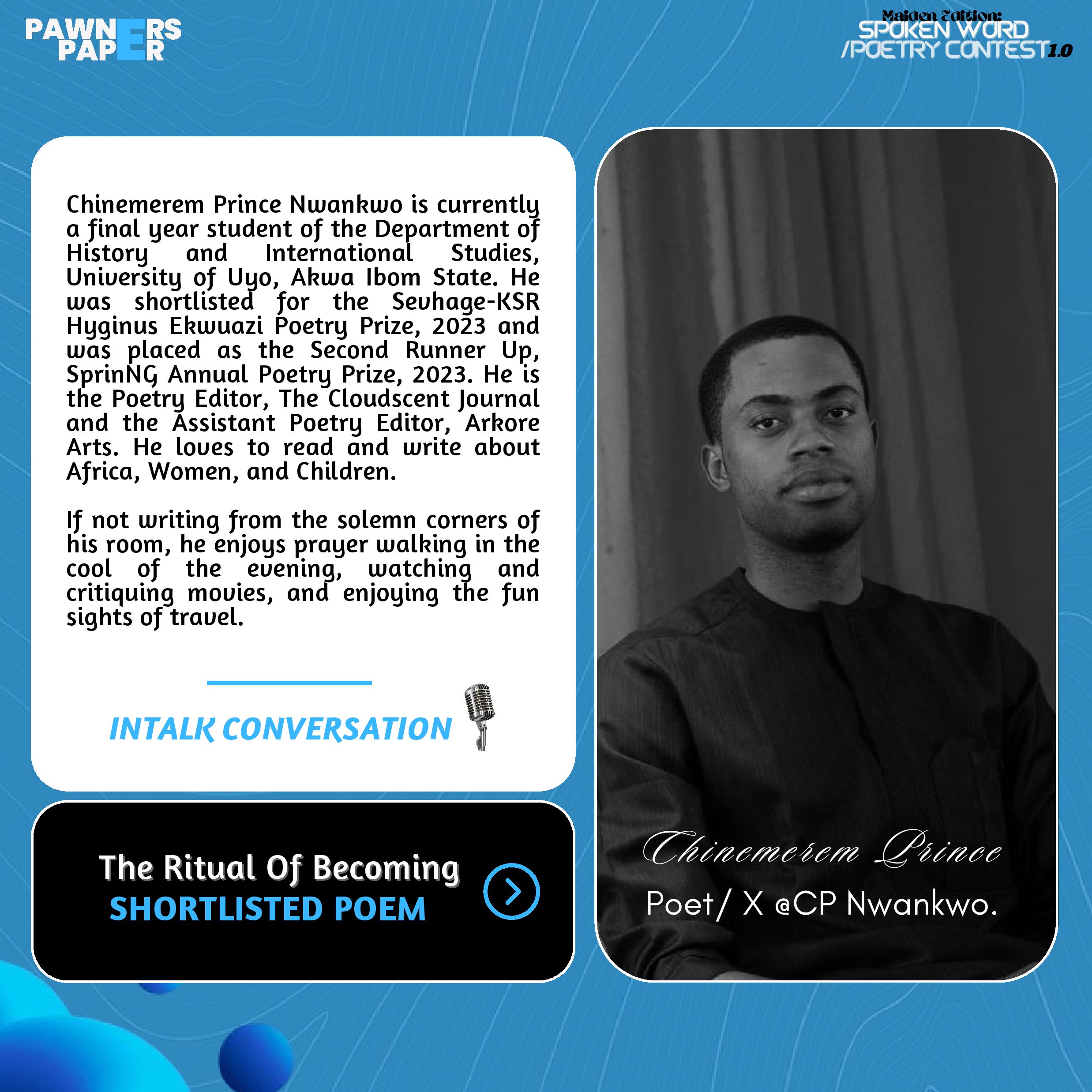In this short interview, Chinemerem shares his perspectives on poetry, the figurative usage of words without diluting the messages intended to convey.
Chinemerem Prince Nwankwo's poem "The Ritual of Becoming" was shortlisted for the Pawners Paper's Spoken Word and Poetry Contest.
Chinemerem Prince Nwankwo, is currently a final year student of the Department of History and International Studies, University of Uyo, Akwa Ibom State. He was shortlisted for the Sevhage-KSR Hyginus Ekwuazi Poetry Prize, 2023 and was placed as the Second Runner Up, SprinNG Annual Poetry Prize, 2023. He is the Poetry Editor, The Cloudscent Journal and the Assistant Poetry Editor, Arkore Arts. He loves to read and write about Africa, Women, and Children.
If not writing from the solemn corners of his room, he enjoys prayer walking in the cool of the evening, watching and critiquing movies, and enjoying the fun sights of travel.
He tweets @ CP Nwankwo.
In this short interview, Chinemerem shares his perspectives on poetry, the figurative usage of words without diluting the messages intended to be conveyed, clarity as a poet's tool, and the conception of poetry in the contemporary world..
How does it feel after making the shortlist? Did you anticipate it?
I felt super excited. It settled in well, although it sprang surprises. And for anticipation, I was open with a competitive mind to believe and dare. Graciously, I was elated at the outcome. Thank you, Pawners Paper.
What's the story behind your entry?
The year is a pretty new one, and people are being and becoming. Somewhat the contemplation and introspection on self and sojourn held me bounds to my pen, and the right experience at the time was immersion. Emerging and exfoliating to the point of revival was the ambit of my inspiration.
Drawing myself to the change beckoning a new phase. I felt everybody craved a new spirit at the moment, so I unboxed it.
Do you believe clarity is a tool every poet and writer should employ?
I believe in the dynamics of arts and language, and usage holds little or no barrier. Clarity is simply good, but the figurative cannot always be the same. I believe everything comes under the eyes of study.
Drawing from these, how have you been able to use words figuratively without contradicting the essence of the message in your poems?
The essence of the poem is the essence of the writing. It becomes imperative to stick to the plan. Diction is a great enhancer to the aesthetic and ambience of a poem generally. I carefully season it with the right registers and word implications.
Once I stay focused and directional with language, the outcome is beautiful experimentation and expression.
What do you think is the misconception that people often have contemporary poetry, even as a means of evoking emotions and feelings?
The evolution of poetry has not really enjoyed a wider embrace in the present scope of time, especially from readers who think it is a tilt from the norm. Contemporary poetry parades itself in subjectivity and exploration, which sometimes burdens the reading audience.
If it is poetry, it will evoke emotions and certainly entertain. Poetry is evolving and not phasing out, as some suppose; the reading culture should be elevated to follow suit. Put differently, some believe that poetry only intellectually excites, lacking emotional resonance, but true poets* never deviate.
Lastly, what do you think poetry is?
I'll love to jokingly answer this way: poetry is whatever the poet says it is. Truly, I cannot direct you to an acceptable definition. I can surely say that poetry is bringing words to life, navigating people through the aisle of emotions, and telling a story that paints one into a world of his or her own reflection—say poetry is a mirror that's unrepentant of truth.



.png)
%20(1).jpeg)

%20(3).jpeg)

COMMENTS